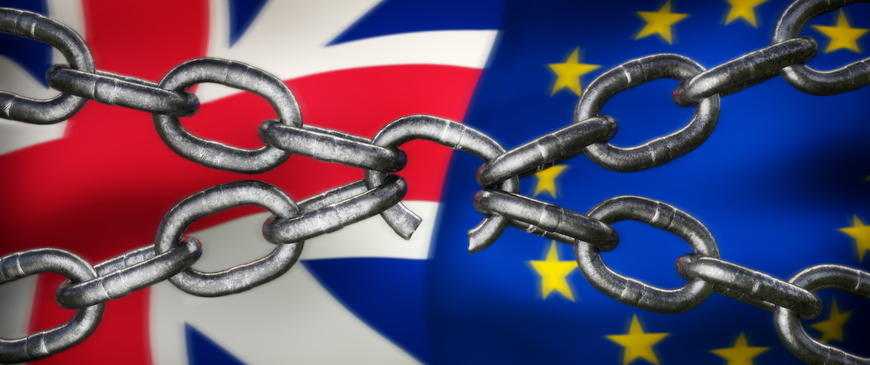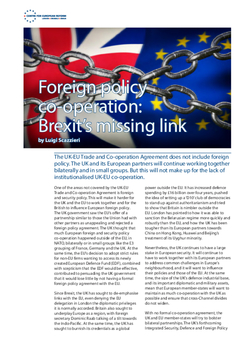
Foreign policy co-operation: Brexit's missing link
The UK-EU Trade and Co-operation Agreement does not include foreign policy. The UK and its European partners will continue working together bilaterally and in small groups. But this will not make up for the lack of institutionalised UK-EU co-operation.
One of the areas not covered by the UK-EU Trade and Co-operation Agreement is foreign and security policy. This will make it harder for the UK and the EU to work together and for the British to influence European foreign policy. The UK government saw the EU’s offer of a partnership similar to those the Union had with other partners as unappealing and rejected a foreign policy agreement. The UK thought that much European foreign and security policy co-operation happened outside of the EU, in NATO, bilaterally or in small groups like the E3 grouping of France, Germany and the UK. At the same time, the EU’s decision to adopt strict rules for non-EU firms wanting to access its newly created European Defence Fund (EDF), combined with scepticism that the EDF would be effective, contributed to persuading the UK government that it would lose little by not having a formal foreign policy agreement with the EU.
Since Brexit, the UK has sought to de-emphasise links with the EU, even denying the EU delegation in London the diplomatic privileges it is normally accorded. The UK has also sought to underplay Europe as a region, with foreign secretary Dominic Raab talking of a tilt towards the Indo-Pacific. At the same time, Britain has sought to burnish its credentials as a global power outside the EU. It has increased defence spending by £16 billion over four years, pushed the idea of setting up a ‘D10’ club of democracies to stand up against authoritarianism and tried to show that Britain is nimbler outside the EU. London has pointed to how it was able to sanction the Belarusian regime more quickly and robustly than the EU, and how the UK has been tougher than its European partners towards China on Hong Kong, Huawei and Beijing’s treatment of its Uyghur minority.
Nevertheless, the UK continues to have a large stake in European security. It will continue to have to work together with its European partners to address common challenges in Europe’s neighbourhood, and it will want to influence their policies and those of the EU. At the same time, the size of the UK’s defence industrial base, and its important diplomatic and military assets, mean that European member-states will want to maintain as much co-operation with the UK as possible and ensure that cross-Channel divides do not widen.
With no formal co-operation agreement, the UK and EU member-states will try to bolster bilateral partnerships. The UK’s forthcoming Integrated Security, Defence and Foreign Policy Review is likely to prioritise deeper relations with Paris, with whom London already has a close partnership under the 2010 Lancaster House Treaties, and also with Germany, Italy and the members of the UK-led ‘Joint Expeditionary Force’: the Netherlands, Denmark, Norway, Sweden, Finland and the Baltics. To strengthen these partnerships, the UK will probably remind its partners of its continued large contribution to European security, with British troops and air patrols in the Baltic states and Poland to deter Russia, air and naval patrols in the Black Sea Region and (recently increased) support for French-led efforts to stabilise the Sahel.
With no formal co-operation agreement, the UK and EU member-states will try to bolster bilateral partnerships.
Co-operation in small groups outside of the EU, like the E3, will gain prominence. In recent years, the E3 has expanded beyond its original remit of dealing with Iran to also sometimes discussing issues like Syria and the South China Sea, and it is valued by its members as an effective and flexible framework. Another forum for co-operation could be a ‘European Security Council’ (ESC), a French idea recently revived by Europe minister Clément Beaune. The idea would be to keep the UK closely plugged into European security through regular meetings. However, the details remain vague.
An ESC could be an EU+UK meeting format, a new institution outside the EU, or an informal framework outside the Union. The key issue is membership. If the ESC were a small grouping, it could generate common thinking among the largest European states. After reaching a joint position with the UK, the ESC members could push the EU to act and it would be harder for other member-states to hinder a common response. However, there would be risks: the more an ESC was formalised, and the more selective its membership, the more it would annoy EU institutions and excluded member-states. Many smaller member-states were unhappy with being left out of the E3 even when the UK was an EU member. Friction will be higher now the UK is no longer a member, and smaller member-states will be particularly resentful if co-operation between some member-states and the UK takes place in a grand-sounding ESC. At the same time, Germany prioritises maintaining EU unity, and is concerned that an exclusive ESC would undermine it.
If the ESC had a broader membership or also included the EU High Representative, it would be less divisive but find it harder to reach consensus. This makes a broad ESC unappealing to France and to the UK, who prize the flexibility and agility of the E3. Given these concerns, an ESC may not materialise. Instead, it is likelier that we will see an expansion of the E3, with more issues discussed and more consultations between officials and ministers. The E3 may also expand in membership to become an ‘E3+’, with member-states like Italy, Spain or Poland joining France, Germany and the UK, depending on the issue. With transatlantic policy differences set to shrink under President Biden, diplomacy towards many issues in the EU’s neighbourhood may take place in small groups including the main EU member-states and the US. Some of these groups will be linked to the EU, with the High Representative participating.
In the absence of a formal UK-EU foreign policy agreement, informal arrangements will help keep the UK connected to European foreign and security policy. But informal arrangements cannot substitute for formal co-operation. The UK will find it difficult to influence EU positions on many issues, as other member-states are only likely to involve London when it is in their interest. The lack of a co-operation agreement will make it harder for the UK to influence EU sanctions and keep abreast of what EU institutions and member-states think. It will also be difficult to shield informal foreign policy co-operation from tensions in the broader UK-EU relationship.
The UK will find it difficult to influence EU positions on many issues, as other member-states are only likely to involve London when it is in their interest.
Over time, lack of influence might push the UK to seek a closer foreign and security policy relationship with the EU, particularly if EU defence tools like the EDF become more successful, and British defence firms find it harder to access the European market. Under Biden, the US is also likely to encourage the UK and the EU to build closer relations. In the short term, there is some scope for closer UK-EU co-operation even without a formal overarching agreement, through informal contacts between the UK and EU institutions and co-ordination on sanctions. But a future British government may want to revive Theresa May’s ambition of building an ambitious special security partnership with the EU. For its part, the EU could be willing to offer the UK something close to that if the overall UK-EU relationship improves.
Luigi Scazzieri is a research fellow at the Centre for European Reform.

